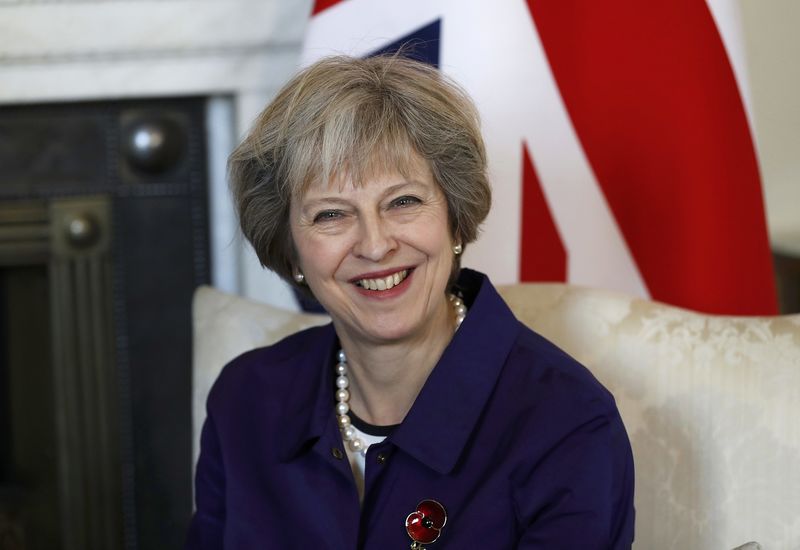By William James and Kylie MacLellan
LONDON/NEW DELHI (Reuters) - British Prime Minister Theresa May said on Sunday she would deliver a full exit from the European Union, hitting back at critics of her Brexit strategy who have threatened to try to block the process in parliament.
The government's plans to begin a two-year divorce process by the end of March were thrown into disarray last week when a court ruled that parliament must be consulted on the decision. May has said she is confident of overturning that ruling.
Nevertheless, the prospect of a parliamentary vote has enraged eurosceptic lawmakers who fear the 'hard Brexit' they want will be watered down, and emboldened political opponents who want a less radical split from the bloc.
Writing in the Sunday Telegraph newspaper, May signalled she would resist any attempt to force her to change her approach to leaving the EU, a break that was approved by 52 percent of Britons in a referendum in June.
"The people made their choice, and did so decisively. It is the responsibility of the government to get on with the job and to carry out their instruction in full," May wrote.
She said revealing her strategy for the talks would weaken Britain's negotiating position and that members of parliament who regretted the referendum result "need to accept what the people decided".
The Daily Mirror reported the head of Britain's opposition Labour Party, Jeremy Corbyn, had said he would vote against the commencement of divorce talks with the EU if the government does not agree to his Brexit demands.
He later tweeted that he would not try to block the process.
May's government, which has given little away about its plans for Britain's future relationship with the EU, has said that having to set out a detailed negotiating strategy to parliament would put it at a disadvantage in the talks.
"While others seek to tie our negotiating hands, the government will get on with the job of delivering the decision of the British people," May said in a separate statement before leaving on a trade visit to India on Sunday.
The court ruling triggered an angry response from some lawmakers and newspapers, with minister Sajid Javid calling it an "unacceptable" attempt to "frustrate the will of the British people", while The Daily Mail said the three judges who handed down the ruling were "enemies of the people".
May said she believed in the value of the independence of the judiciary, as well as a free press.
"These both underpin our democracy and they are important," she told reporters on the plane to India.
HALF-BREXIT
Arch-eurosceptic Nigel Farage, who led the influential UK Independence Party's Brexit campaign, said there was a growing movement to keep Britain within the EU's tariff-free single market - a scenario he called a "half-Brexit" that went against the referendum result.
"If the people in this country think that they're going to be cheated, they're going to be betrayed, then we will see political anger the likes of which none of us in our lifetimes have ever witnessed in this country," he told the BBC.
Parliament could in theory block Brexit because most members supported staying in the EU in June's referendum. But many lawmakers have signalled they would be willing to reverse their position to reflect the referendum result.
"I think it is highly unlikely that parliament would not, in the end, back a decision to trigger Article 50," health minister Jeremy Hunt told the BBC, referring to the EU treaty mechanism for beginning the process of leaving.
Last week's court ruling could allow lawmakers to temper the government's approach, however, making a "hard Brexit" - where tight controls on immigration get priority over remaining in the single market - less likely.
Corbyn told the Sunday Mirror that Labour's "Brexit bottom line" would require guarantees for access to the single market for exporters, continued protection of workers' rights, safeguards for consumers and the environment, and pledges that Britain would make up any loss of EU capital investment.
Corbyn said he would welcome an early national election if May refused to meet his demands but later toned down his position on any parliamentary vote, tweeting: "We won't block Article 50 but will fight for a Brexit that works for Britain."
The next national election is not due until 2020, and the government has so far resisted pressure to dissolve parliament and seek a stronger mandate.
"I think a general election is frankly the last thing that the government wants ... It's the last thing that the British people want," Hunt said.
A government appeal against the High Court ruling is expected to be considered by Britain's Supreme Court early next month. May has said she still plans to invoke Article 50 by the end of March.

The lead claimant in the High Court case, Gina Miller, said on Sunday that Scotland - which voted to remain in the EU in the referendum - was likely to join the case as it goes to the Supreme Court. However, Scottish First Minister Nicola Sturgeon said it had not yet decided to take part.